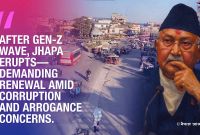Balen Shah’s 12 Major Controversies: From Threatening to Burn Singha Durbar to Displaying Greater Nepal’s Map!

Since his election as the Mayor of Kathmandu, Balen Shah has been a figure of both admiration and controversy. His direct approach and bold decisions have attracted significant public attention, while his unconventional style of leadership has often placed him in the center of numerous debates. This article outlines 12 major controversies surrounding Balen Shah’s tenure as mayor, which have sparked discussions not just at the national but also at the international level.
12 Major Controversies Explained:
1. Bulldozer Campaign and Demolition Controversy:
One of Balen Shah’s first actions as mayor was the aggressive removal of illegal structures across Kathmandu. He ordered the demolition of homes, shops, and commercial buildings deemed to be in violation of city planning rules. While his actions were legally justified, they sparked outrage, especially among small business owners and residents who had lived in the area for decades. Critics argued that the demolitions were too harsh, insensitive, and conducted without providing adequate alternatives or compensation to the displaced.
2. Dumping Garbage at a Political Party’s Office:
Amid a growing waste management crisis in Kathmandu, Balen Shah took an unprecedented step by ordering municipal garbage to be dumped outside the office of the Maoist party. This symbolic protest was aimed at drawing attention to the city's waste management issues, blaming political inaction. While some lauded the move as a bold statement, others viewed it as a stunt that further politicized the problem, deepening divisions between the mayor and political parties.
3. Threat to Burn Down Singha Durbar:
Balen Shah stirred significant controversy when he openly threatened to "burn down Singha Durbar"—Nepal’s central government headquarters—if the federal government did not provide adequate support for development projects in Kathmandu. The remark, considered highly inflammatory, was condemned as irresponsible and provocative, with many labeling it an unnecessary escalation that undermined his role as a public servant.
4. Conflict with the Department of Roads:
As public frustration over Kathmandu’s poorly maintained roads mounted, Balen Shah staged a dramatic protest by piling garbage in front of the Department of Roads’ office. He accused the department of negligence and inaction regarding road maintenance. While his actions drew attention to the issue, they were criticized for being overly theatrical and failing to foster cooperation between the city and the federal government.
5. Ongoing Disagreements with the Federal Government:
Balen Shah has frequently clashed with the federal government on a range of issues, from waste management to urban development. His confrontational stance towards federal authorities has been both lauded as courageous and criticized as disruptive. The constant tension between his office and central authorities has raised concerns about his ability to effectively collaborate with other government bodies, which many argue is essential for the capital’s development.
6. Facebook Status Removal Controversy:
Balen claimed that his Facebook posts criticizing politicians, particularly targeting UML leader Rekha Sharma, were removed by the government. This accusation led to a social media uproar, with his supporters launching an "Unfollow" campaign against Prime Minister Sher Bahadur Deuba and other government officials. This controversy escalated tensions between Balen and the ruling establishment, turning social media into a battleground.
7. Mishandling of Child Labor Allegations:
When Rekha Sharma was accused of employing child labor, Balen Shah reacted aggressively, openly criticizing her in the media. His confrontational stance further fueled political drama, bringing him into conflict with powerful political figures. His handling of the issue sparked debate about his approach to sensitive social matters and his readiness to engage in public feuds rather than resolving them diplomatically.
8. Cultural Heritage Disputes:
Balen’s plans to modernize and alter parts of Kathmandu’s traditional and cultural heritage sites also met with opposition. His initiatives to introduce contemporary changes to historic areas were viewed by some as a threat to the city’s cultural fabric. Preservationists and traditionalists accused him of neglecting Kathmandu’s ancient identity in favor of rapid, unplanned modernization, which could harm its long-standing heritage.
9. Accusations of Nepotism:
Balen Shah faced allegations of nepotism regarding certain appointments within the municipality’s administration. Critics claimed that he was selecting individuals for key positions based on personal connections rather than merit. These accusations raised concerns about transparency and fairness in his leadership, tarnishing his reputation as a reformist mayor.
10. Controversy Over Evicting Street Vendors:
In an effort to clear Kathmandu’s sidewalks and make space for pedestrians, Balen Shah led a campaign to remove street vendors who had long been operating on footpaths. While the initiative was intended to bring order to the city’s streets, it drew heavy criticism from those who saw it as anti-poor, as it severely impacted the livelihoods of small traders and vendors. Many argued that the mayor’s decision lacked empathy towards vulnerable groups.
11. Kathmandu District Court Controversy:
Balen sparked another legal controversy when he publicly questioned the construction quality and legal processes related to the Kathmandu District Court building. He raised concerns about corruption and irregularities in the court’s construction, which drew the ire of the judiciary and sparked debates over his involvement in matters beyond his jurisdiction. His comments were seen as an overreach into the judicial domain, further intensifying criticism from legal experts.
12. Greater Nepal Map Controversy:
Perhaps one of the most internationally sensitive controversies was Balen Shah’s decision to display the map of ‘Greater Nepal’ in his office. The map depicts territories that were historically part of Nepal but are now within Indian borders, sparking diplomatic tension. Critics pointed out that international relations and border disputes fall outside the jurisdiction of a municipal office, accusing Balen of unnecessarily interfering in foreign affairs. His actions were seen as a provocation that risked straining Nepal-India relations, with many arguing that the mayor should focus on local governance instead of international politics.
Conclusion:
Balen Shah’s tenure as mayor has been anything but uneventful. While he has been praised for his boldness and willingness to take on established power structures, his actions have often landed him in the middle of major controversies. From local issues like road maintenance and waste management to international disputes, his leadership style has attracted both strong support and intense criticism. Whether his confrontational approach will lead to long-term success or further challenges remains to be seen, but there’s no denying that Balen Shah has left an indelible mark on Kathmandu’s political landscape.
Balendra Shah Greater Nepal Phanindra Nepal




![From Kathmandu to the World: How Excel Students Are Winning Big [Admission Open]](https://nepalaaja.com/img/70194/medium/excel-college-info-eng-nep-2342.jpg)


